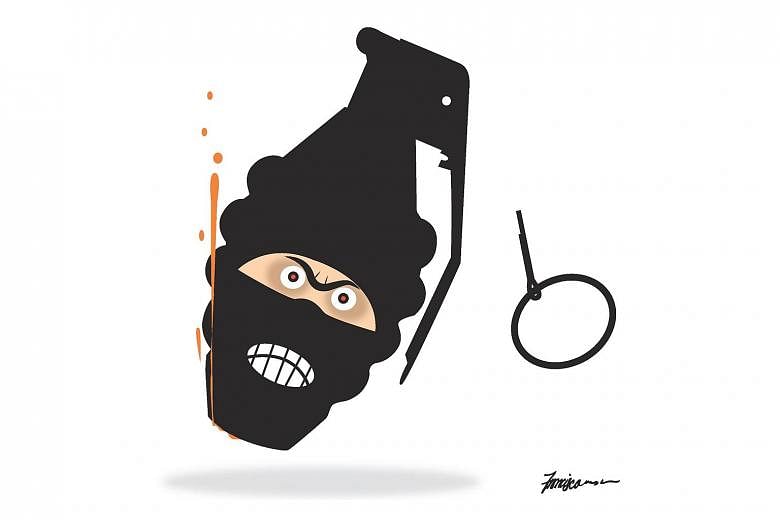LONDON • The Islamic State in Iraq and Syria terrorist organisation is being defeated, US President Donald Trump claimed when he visited the Pentagon for a strategy gathering at the end of last week. "We're doing very well against ISIS; ISIS is falling fast, very fast," Mr Trump added.
Coming at the six-month mark of his presidency, Mr Trump's sense of achievement is both genuine and deserved, for the progressive elimination of one of the world's nastiest terrorist networks is a victory which the current administration in Washington can claim as its own; many others are contributing to fighting ISIS, but its defeat would not have been possible without the dispatch of additional American troops and resources which President Trump ordered the moment he walked into the White House.
The snag is that neither the US President nor his top ministers or advisers seem to have thought too much about what may follow the eradication of ISIS. And unless a coherent strategy is put in place soon, all that will happen after the defeat of ISIS is the return of all the Middle East's other problems.
In a region which loves fantasy tales, few conspiracy theories are currently more widespread than the accusation that the Americans themselves are responsible for ISIS' creation. "It is America who created ISIS in the first place and now Washington seeks to establish military bases on Iraqi territory in order to defeat it and maintain influence" - so claimed over the weekend none other than Mr Nouri al-Maliki, Iraq's former prime minister and now still the country's Vice-President.
But as is often the case with such nonsensical Middle Eastern conspiracy theories, they are invented and propagated largely in order to absolve local leaders from their own responsibility for the region's dire predicament.
BACK TO THE SUNNI-SHI'ITE DIVIDE
And the reality is that the rise of ISIS, which claims religious and political authority over all Muslims worldwide, was helped by the sense of injustice felt by Iraq's Sunni Muslims, who were progressively and systematically marginalised from exercising either political power or economic influence by people such as Mr Maliki and his fellow Shi'ites who have controlled Iraq since the US-led invasion of the country in 2003.

Integrating Iraq's Sunnis has never been easy: The community, which represents around a third of the inhabitants and ruled the country until Saddam Hussein's overthrow, remains resentful of its politically reduced status and lacks leaders able to represent it at a national level in Baghdad, the Iraqi capital.
Be that as it may, the problem of the Sunnis' marginalisation is likely to become even more acute once ISIS is eradicated. For it will not be long before another terrorist organisation claims to represent the Sunnis' grievances. And it will not be long either before other Arab governments begin to divert their money and weapon supplies to whatever Sunni organisation is able to stand up to the Shi'ites.
For the moment, there are no indications that the government of Iraqi Prime Minister Haider al-Abadi, a British-trained Shi'ite politician who replaced Mr Maliki precisely in order to provide an environment inclusive for Iraq's Sunnis, has done what was expected of him. In fact, precisely the reverse has happened, as the government in Baghdad relied on the Shi'ites in order to defeat ISIS and reclaim territory from the terrorist organisation.
The biggest beneficiaries of this anti-ISIS struggle have been the Shi'ite militias belonging to the so-called Hash'd al Shaabi, or the Popular Mobilisation Forces (PMF), created on the orders of the most senior living cleric in Shi'ite Islam, Grand Ayatollah Ali al-Sistani, in response to the seizure of Mosul by ISIS terrorists in 2014.
Since then, the PMF, which bore the brunt of Iraq's anti-ISIS recent offensives and now numbers well over 100,000 fighters, has become one of neighbouring Iran's most potent proxy instruments. And in a strategy which directly mirrors that of Iran's Islamic Revolutionary Guard Corps, the PMF is now a political, rather than purely military force; it is inconceivable that the militia or its Iranian paymasters would defeat ISIS only in order to then share power with Iraq's Sunnis. Besides, Iran has an astonishing constellation of no fewer than 40 various other militias in Iraq.
ENTER THE KURDS
And very soon Iraq's problems will grow even worse as the country's substantial Kurdish population plans to hold an independence referendum on Sept 25. The Kurds' leader Massoud Barzani has spent years pretending that he is not seeking independence, but merely more control and more financial resources for his autonomous Kurdistan Region. But with ISIS now about to be defeated and the future of Iraq back on the agenda, Mr Barzani is moving fast to stake his claim to establish a state.
The result of the planned September referendum is hardly in doubt; the Kurds - who are divided between large communities in Turkey, Syria, Iraq and Iran - have spent more than a century aspiring to their own state, and are unlikely to flinch at seizing an opportunity now. Still, the referendum is a huge gamble, which may well plunge Iraq into an even bigger bloodbath.
Mr Barzani is only staking a claim for the Kurds of Iraq and believes that he will have Turkey's support; although the Turks fear the emergence of a Kurdish state, they fear the Kurds of Syria more than those of Iraq, so Turkey may well wish to split the Kurds by supporting those in Iraq, while continuing to crush those in Syria.
Still, that will mean that Turkey will be drawn even deeper into the existing wars of the Middle East, as will Iran, which harbours equal fears of an independent Kurdish state.
Mr Barzani hopes he may be able to play off Iran against Turkey. But he may be over-estimating his strength. For it is inconceivable that the Iraqi government in Baghdad will simply accept the country's break-up without a murmur. And even if it does, disputes over the ownership of key cities such as oil-rich Kirkuk, whose population is at least half Kurdish, will rumble on for years.
THE SYRIA QUESTION REMAINS
And then, there is the broader question of neighbouring Syria's fate. Actively supported by Russia and Iran, the fortunes of Syrian leader Bashar al-Assad are improving. Most governments - including those of France, the old colonial power which still has a great deal of influence on the matter - are no longer insisting on Mr Assad's removal, and most countries accept that he will remain in control; a year ago, there were only nine ambassadors remaining in Damascus, the Syrian capital, while today, their number has risen to 19, and includes representatives of China and India.
Still, after a civil war which has raged for the past six years and killed half a million people and displaced about a quarter of the population, there is no chance for Syria to remain a unified state. And although Turkey may try to keep the Kurds of Syria separate from those of Iraq, that is easier said than done.
The chances are, therefore, high that Syria will join Iraq in a lethal regional proxy game in which Iran is trying to create a "strategic corridor" connecting all its Shi'ite militias straddling from the Gulf to the Mediterranean Sea and cutting across the territories of Iraq, Syria and Lebanon, while other Arab governments strive to prevent this by arming their own militias.
And the United States? America's inability or unwillingness to articulate what it wants in the area merely fuels further regional instability.
Iran acts as though it no longer has to consider the US as a regional actor. The Iraqi government believes it won't be subjected to further pressure to integrate its Sunnis, so it does nothing. The Kurds assume the US will ultimately support their independence if only because the Americans are building a huge "consulate" in Erbil, the capital of Iraq's Kurdish region. And the Russians assume they'd be left in control of Syria.
The Americans cannot be blamed for the current Middle Eastern mess; other powers outside the region are just as guilty, and the region's biggest problems remain home-grown. Still, it's hard to escape the conclusion that the defeat of ISIS will only bring all these latent crises to the fore.
So it could well be that, as incredible as this now seems, we may recall the past few years as a period of relative stability, before the real Middle East storm is unleashed.


